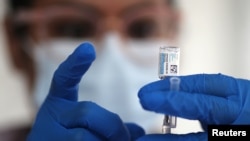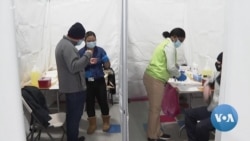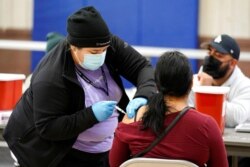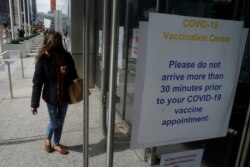U.S. health officials have pressed pause on the Johnson & Johnson vaccine after a handful of people developed a rare but serious blood-clotting disorder following vaccination.
Six cases have been reported so far, out of nearly 7 million doses given.
The Johnson & Johnson vaccine makes up a small proportion of the U.S. vaccine supply, so the setback may be relatively minor. But experts say the problem may make more people reluctant to get vaccinated.
The six cases occurred among women between 18 and 48 years old, between six and 13 days after vaccination. The patients developed an unusual combination of blood clots and low platelet counts. One woman died, and one was hospitalized.
"These events appear to be extremely rare," said Peter Marks, director of the Center for Biologics Evaluation and Research at the U.S. Food and Drug Administration. But Marks said safety is a top priority, "and we take all reports of adverse events following vaccination very seriously."
An expert panel will meet Wednesday to investigate the clotting cases and decide whether to recommend continuing to use the Johnson & Johnson shot. With nearly 560,000 Americans dead of COVID-19, regulators will evaluate whether the benefits of the effective vaccine outweigh the risks of rare clotting disorders. They expect to reach a decision "in a matter of days," Acting FDA Commissioner Janet Woodcock said.
For those who already received the vaccine, officials stressed that the risk of clots is extremely low and has only been reported about a week or two after vaccination.
The symptoms of a serious clotting problem include severe headaches, abdominal or leg pain, and shortness of breath. Patients who experience those symptoms should tell their doctor if they have been vaccinated recently because treating these kinds of clots requires different treatment than normal, and standard treatment can be harmful, officials said.
Vaccination drive continues
Pausing the Johnson & Johnson vaccine "will not have a significant impact on our vaccination program," White House COVID-19 Response Coordinator Jeff Zients told reporters Tuesday.
He said the Johnson & Johnson vaccine accounts for less than 5% of the shots delivered so far. The Biden administration had secured enough Pfizer-BioNTech and Moderna COVID-19 vaccines to immunize 300 million adults by the end of July, he added.
"The bottom line is, the vaccines that are now being administered are clearly safe and are saving lives," Zients said. "Every American should get vaccinated when it's their turn."
The fact that regulators spotted a one-in-a-million adverse event is, in a way, a good sign, noted vaccine expert Paul Offit, director of the Vaccine Education Center at Children's Hospital of Philadelphia.
"You can be reassured that the other vaccines don't have that rare side effect or else it would have also been picked up," he said.
The adverse reactions appear very similar to a small number of cases of serious blood-clotting problems linked to the AstraZeneca COVID-19 vaccine in Europe and Britain.
Those patients appear to have developed an immune response to a protein that platelets produce, according to a new study.
The same thing may be happening with the Johnson & Johnson vaccine.
"I think it's a rare phenomenon, but I think it's real," Offit said.
'Very wise'
Bad news about the vaccines will likely make it harder to get enough people vaccinated to stop transmission of the virus, experts say.
"I think there's no doubt that it will make hesitant people even more hesitant, which will mean that we have a bigger job to do to reach out to them, whatever the results of the investigation are," said infectious diseases professor William Schaffner at Vanderbilt University Medical Center.
Schaffner called the pause "very wise," adding it "actually reinforces the notion that we have an excellent, comprehensive and very transparent vaccine safety system in the United States."
Experts have been cautioning that these kinds of one-in-a-million problems tend to pop up as the vaccines move from clinical trials involving tens of thousands of people to large-scale use among hundreds of millions.
"That's what happens when there's very widespread implementation of any new therapy," said Jeffrey Kahn, director of the Johns Hopkins Berman Institute of Bioethics. "We just haven't experienced this before, where we have a set of brand new vaccines that we're trying to effectively vaccinate everybody in the world with."
Thirteen other countries and the World Health Organization have authorized the Johnson & Johnson vaccine.
It is favored for harder-to-reach populations because it requires just one shot and can be stored at refrigerator temperatures. The Pfizer, Moderna and AstraZeneca vaccines require two doses, and the Pfizer and Moderna shots need ultra-cold storage.
VOA's Patsy Widakuswara contributed to this report.








